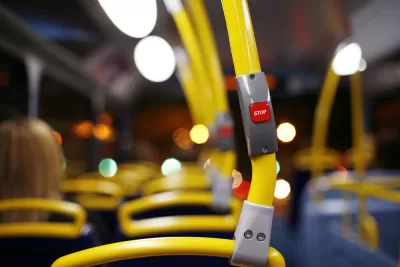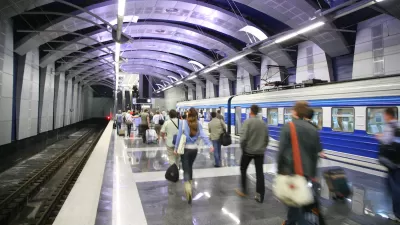As people re-evaluate their transportation decisions, the argument to support transportation demand management might not be what policy makers expected.

The Mobility Lab team wants transportation demand management (TDM) professionals to potentially reexamine the organizational goals and definitions of their work.
A post by Paul Mackie of Mobility Lab asks the question: "Would a common definition of the term and practice of transportation demand management help the industry find other funding sources, do better lobbying for policies, and gain wider acceptance and popularity?"
Mackie builds on the arguments from a presentation by Kirk Hovenkotter, a program analyst at TransitCenter and Mobility Lab contributor. According to Hovenkotter's argument, as described by Mackie, one of the primary sources of federal funding for TDM programs leads practitioners astray by focusing on ideas that don't reflect the preferences of users.
More specifically: "With 59 percent of funding for regional TDM programs throughout the country coming from the federal Congestion Mitigation and Air Quality (CMAQ) program, Hovenkotter said TDM organizations are somewhat forced to tailor their work to goals that are not Americans’ top priorities." The targets of the CMAQ program are in its name: traffic congestion and air quality.
Among the findings presented by Hovenkotter: "The top motivations for people [on their urban mobility choices] weren’t traffic congestion or environmental impact, but access to affordable, reliable, efficient transportation options."
The state of Oregon is the first to move away from relying on the TDM term in describing the benefits of such systems. Its statewide plan refers to its "transportation options" rather than transportation demand management.
FULL STORY: Rebranding “TDM” Could Fix the Industry’s Communications Struggle

Planetizen Federal Action Tracker
A weekly monitor of how Trump’s orders and actions are impacting planners and planning in America.

Maui's Vacation Rental Debate Turns Ugly
Verbal attacks, misinformation campaigns and fistfights plague a high-stakes debate to convert thousands of vacation rentals into long-term housing.

Cuomo Is the Candidate of Both NIMBYs and Developers. What Gives?
In the New York City mayoral race, odd bedfellows align to preserve the housing status quo.

The Subversive Car-Free Guide to Trump's Great American Road Trip
Car-free ways to access Chicagoland’s best tourist attractions.

San Antonio and Austin are Fusing Into one Massive Megaregion
The region spanning the two central Texas cities is growing fast, posing challenges for local infrastructure and water supplies.

Charlottesville Temporarily Has No Zoning Code
A judge ordered the Virginia city to throw out its newly revised zoning code, leaving permitting for new development in legal limbo.
Urban Design for Planners 1: Software Tools
This six-course series explores essential urban design concepts using open source software and equips planners with the tools they need to participate fully in the urban design process.
Planning for Universal Design
Learn the tools for implementing Universal Design in planning regulations.
Heyer Gruel & Associates PA
JM Goldson LLC
Custer County Colorado
City of Camden Redevelopment Agency
City of Astoria
Transportation Research & Education Center (TREC) at Portland State University
Jefferson Parish Government
Camden Redevelopment Agency
City of Claremont





























